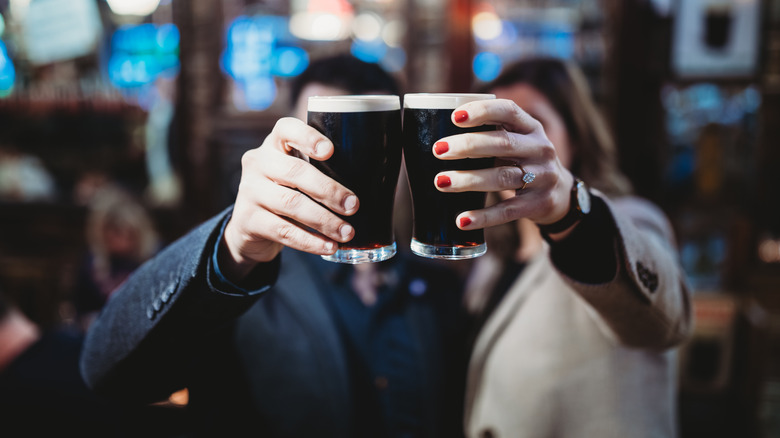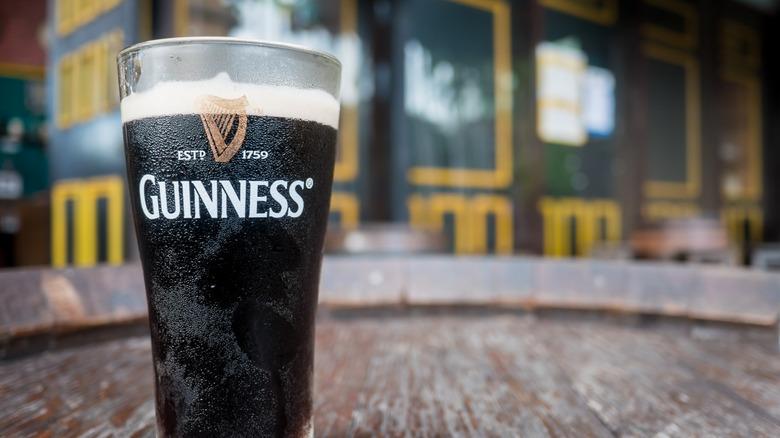The Guinness Diet Has One Unexpected Health Benefit
Nothing beats a cold beer on a warm day. With the popular Irish brand Guinness, there's the added benefit of a rich and dark flavor that feels almost creamy in your mouth.
Named after its inventor, Arthur Guinness, who first started brewing this beer on a four-acre land in Dublin, Guinness has long been marketed as a "meal in a glass," per Food Network. It's hard to pinpoint exactly how and where the Guinness diet came to be, but perhaps its marketing had something to do with it. As explained by professor emeritus at the Department of Food Science and Technology, University of California, Davis, Dr. Charlie Bamforth (via Eating Well), "There was a time in the middle of the 20th century where Guinness was advertised on a slogan of 'Guinness Is Good for You'. Otherwise, it somehow developed as a word-of-mouth thing."
The Guinness diet, which might sound like a dream come true for beer aficionados, is essentially a myth that a human being can survive on just a liquid diet that consists of Guinness beer and nothing else. Part of the reason for such a notion (that the Guinness company doesn't endorse or promote) might be the one unexpected health benefit of this brand of beer – it has a higher concentration of antioxidants, B vitamins, and mineral silicon than other beers.
Guinness might be healthier than other beers
Beer drinkers usually have their favorites, but for Guinness lovers, there's even more reason to support their loyalty to the brand. The dark brew might just be the best in terms of nutritional profile. In addition to containing unmalted barley (which basically means more fiber in the beverage), Guinness also has a higher concentration of antioxidants, vitamins, mineral silicon, and prebiotics than other beers. Fiber is essential for gut health, and antioxidants combat inflammation in the body. Polyphenols — the type of antioxidants in barley — have been linked with heart health and glycemic control, per a 2020 study published in Nutrition Reviews.
The impressive health benefits don't end there, it would seem. General practitioner Dr. Hilary Jones shared with Daily Express "This [Guinness] is full of calcium, which is good for teeth and bones ... Plenty of iron in there for oxygen supply to the body through red blood cells. And it's also got some vitamin B in it, which is very good for brain function."
Considering how much richer and frothier a mug of Guinness beer tastes, you may be inclined to think that it has more calories, but this isn't the case either. Calories can be gleaned with alcohol percentage, and Guinness beer actually has a lower alcohol percentage (4.2% to be specific) than most beers which average at 5%. The frothiness is actually due to the fact that Guinness beers go through a carbonation process that mixes nitrogen with carbon dioxide, unlike most beers that only use carbon dioxide.
Does this mean a Guinness diet is healthy?
Despite the beer's health benefits, a Guinness diet is not a safe, healthy, or sustainable way to get all the nutrition your body needs to survive and thrive. You won't get all the protein or fats your body needs with the beer-only diet, for example.
Furthermore, alcohol consumption has conflicting results, as explored by several studies. While a 2019 study in Nutrients suggested that moderate consumption – one drink a day for women and two drinks for men – has been linked to heart health, this isn't a reason to take up drinking beer if you don't drink alcohol or don't enjoy the taste of beer. You're better off following a balanced diet full of lean protein, whole grains, leafy greens, and proper hydration than resorting to just consuming a Guinness beverage for all three meals.
Ultimately, it's important to understand if your diet is doing more harm than good. Healthy muscles, nails, eyes, hair, skin, and organs depend on your ability to get nutrients from all the right sources. And alcohol consumption, unless done with conscious limitations, can lead to other unexpected health and lifestyle problems like depression, broken relationships, and sleep issues. If a Guinness diet can possibly lead to any of those negative consequences, that's all the more reason to not jump on the bandwagon.



